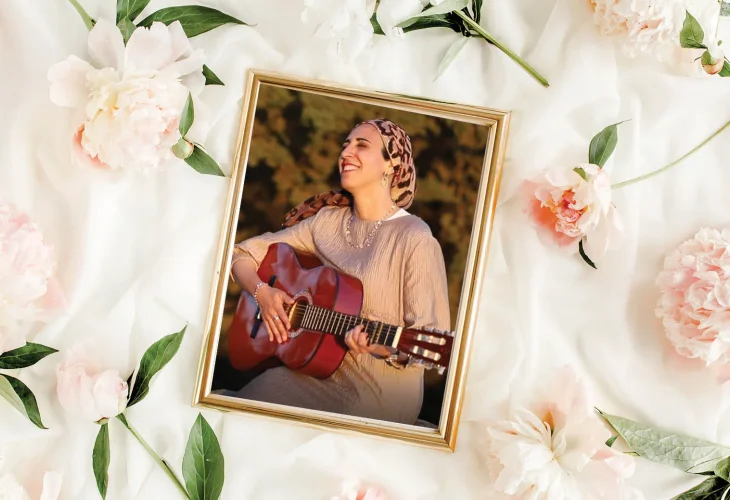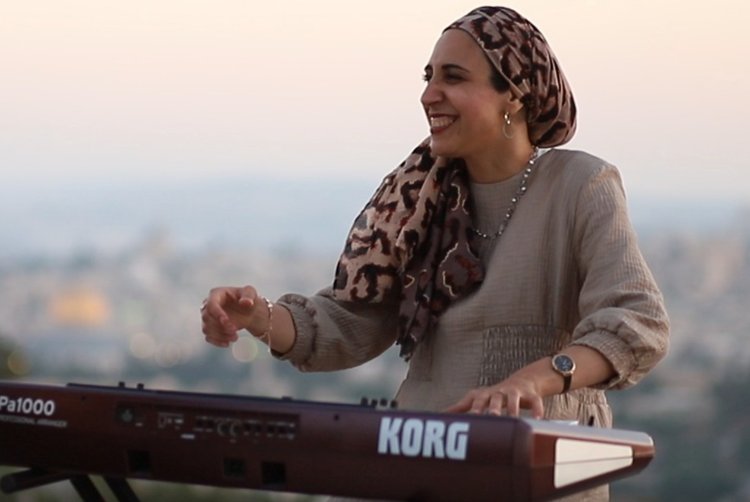Rediscovering Roots: A Musical Journey Back to Judaism
Music and faith intertwined in Maya Zigdon's childhood, leading her family back to Judaism. Yet, life's challenges proved more complex than she ever imagined.
 Maya Zigdon (Photo: Abigail Alper)
Maya Zigdon (Photo: Abigail Alper)Maya Zigdon was just eight and a half years old when her life took a dramatic turn. Her parents took her and her brother to a seminar that changed everything, steering the family onto a path they hadn't traveled before.
"I grew up in an educated and academic household," Maya explains, thirty years after this pivotal event. "My father studied economics and was a successful businessman, yet he was a musical artist at heart. My mother was a dedicated nurse working full shifts, seeing her job as a life's mission. Everything was routine and ordinary until my father decided to explore Judaism more deeply.
"It wasn't due to any trauma or significant event but rather a personal quest to understand life's purpose. Coming from a religious heritage, my father felt a responsibility to examine this way of life from the inside. Even though his siblings didn't adhere to religious traditions, he embarked on a personal journey to rediscover his roots. My mother wasn't enthusiastic, but he moved forward determinedly, step by step.
"As a third-grader, I didn't quite grasp the significance of what was happening. I just felt my parents pulling in opposite directions—my father wanting to make *kiddush* on Friday night, while my mother hurried to turn off the TV, creating a lot of tension. Despite their efforts not to let it affect us, my younger brother and I could feel the undercurrent of stress. It was palpable, as my mother didn't feel drawn to religion, while my father immersed himself, learning, adopting practices, and eventually wearing a small kippah.
Towards a New Path
Maya, a musical prodigy from the age of six, was always close to her father, sharing a love for music. In those early days of religious return, she naturally gravitated towards him.
"It's not that I understood the full depth of Judaism," she clarifies, "but as a child, I was very fearful, especially at night. I often imagined frightening things and struggled with negative thoughts. My mother couldn't do much to soothe me since she often worked night shifts. Even when she was home, her heartfelt attempts to comfort me never truly worked. But then came my father's spiritual awakening, bringing comfort with it. He would reassure me, saying, 'Don't worry, Hashem is watching over you,' suggesting I read psalms, and he would recite the *Shema* with me each night, which filled me with a sense of security.
"My mother, a wise woman, noticed the change in me. Despite her disconnection from Judaism, she couldn't deny that something in me had shifted. When they were invited to attend a seminar, my father eagerly accepted, and my mother agreed on the basis that it was 'for the girl.' Many years later, she admitted she joined because she saw how much my father had changed for the better with the teachings of Torah improving him, and the respect he showed her even without her cooperation stood out, as he was patient and accommodating.
Maya doesn't recall much from the seminar, but she vividly remembers a grand sale at the end where participants could buy Judaic items, prayer books, tefillin, and *tzitzit*, alongside children's reading books by Minucha Fuchs. "I convinced my mother to buy me 'There's Only One Home' and 'Between the Lines,'" Maya recalls. "From that moment, those books became my closest companions. I felt there was something special in them, and each time I looked at the pictures, I wanted to be like the girls in the books, in their school uniforms, attending girls-only schools. I didn't dare ask my mother to switch schools, but my father intervened, along with others, and by fourth grade, I moved to a more religious school."
How did you feel about the change? Were you happy?
"Of course, I was thrilled. I was excited to study with only girls and still remember being chosen to lead prayers, imitating everyone during the *Amidah*, bowing and prostrating as if mimicking a dance. The teachers were kind, and I transitioned well into the religious world. My mother was pleased, my father was at ease, and everything seemed fine on the surface. But deep down, I knew this wasn't quite what I was searching for. I aspired to something different, something higher."
How did you even know there were other possibilities?
"From Minucha Fuchs's books, of course. I saw girls in the books who looked and dressed differently. We also lived in Beit Shemesh, close to an ultra-Orthodox neighborhood. My father used to pray there every Shabbat, and I'd join him, observing the Charedi girls playing jump rope and other games. Sometimes I'd join them and even go with them to read psalms. From these encounters, I knew about other schools and dreamed of learning with those girls."
Maya never imagined her dream would come true in such an unexpected way. "At the end of fifth grade, summer vacation arrived, and without any camp offered by the school I attended, my mother, a full-time nurse, had no other option but to send me to another camp. The only viable choice was 'El HaMaayan,' a Shas-affiliated school near our home. My mother hesitated, partly because it was housed in an apartment, not a proper school building, but she soon realized there was no alternative, and since it was just supposed to be a camp, she accepted it.
"I attended the camp and refused to leave. The headmistress, a warm and unique woman, spoke to my mother and promised she'd give me the best education and room to grow, assuring her that if she was unhappy, she could transfer me back. This woman saved me, allowing me to continue at the school, eventually moving on to 'Neveh Tzion' for high school. Of course, it wasn't always easy. There were trials and challenges, but Hashem always sent me the right people to help, and the music that accompanied me through the years. It evolved from a hobby to a full expression, joining me in programs, conferences, and various events. I performed with my keyboard, sometimes singing and acting on stage. That's how I became deeply involved in music, singing, and acting."
Facing Life's Choices
The world of music, with all its intricacies, continued to be a part of Maya's life as she grew. "I trained at prestigious institutions," she says, "participated in numerous programs, and after getting married, we settled in Beit Shemesh, where I established a recording studio to serve the city's and surrounding area's residents. During that time, I produced the show 'A Mother in Lights,' which was not only successful but also empowering for mothers, and as a young mother, I felt it was the most important thing of all."
Years passed, with Maya raising her children in Beit Shemesh, running a prominent recording studio, and managing various programs and musical events at schools and other venues.
Then came a challenge she couldn't foresee. "Our eldest son was just 14 when he started straying off the path, becoming a troubled adolescent. It was the hardest blow imaginable because he was immensely talented, smart, and accomplished, truly the pride of our family. We had so many hopes for him, and suddenly everything shattered. Personally, it also affected me as a mother. Since my children were born, I have always read books on parenting, explored educational methods, and saw myself as a mother fully invested in her children's upbringing. Then such a blow struck.
 Maya Zigdon (Photo: Abigail Alper)
Maya Zigdon (Photo: Abigail Alper)"These events occurred when I was early into the pregnancy of our seventh child, during an emotionally overwhelming period. As a seasoned musician and composer, I found myself, for the first time, translating my personal emotions into music, turning sounds into words. That's how the song 'I Believe in You' was born, not only played and composed but also written by me. It was written through tears and turmoil, affirming my belief in Hashem and in my son, believing he can and will choose the right path."
The song quickly gained attention, and from the feedback Maya received, she realized she was a voice for many mothers experiencing similar situations. "Amidst the pain and helplessness, I felt like I found a response," she emphasizes. "It gave me the strength to keep creating and advancing professionally. I was selected for a prestigious fellowship led by international cellist Maya Belsitzman and, in collaboration with the Charedi Culture and Arts Association, which chose 12 leading female musicians, connecting them with mentors for top-tier training. Simultaneously, I joined a guidance group from the 'Heart to Soul' organization led by Rabbi Noach Pally. With guidance from Sarah Kaufman, I learned to let go of guilt, recognizing that the choices were my son's, not mine. I learned that, while supporting him with great love, I must also care for myself."
Remembering to Be Thankful
In the past year, Maya made another major change, leaving the proximity of her parents and her numerous clients, moving with her family to the north. "We received a blessing from Rabbi David Abuhatzeira, who unequivocally recommended the move for our children's sake," she explains.
For those curious about her life today, she notes: "At my performances, people often ask about the end of the story, expecting a closed circle where life is now peaceful and challenge-free. I believe those scenarios exist in stories, while real life is always more complex. Thank Hashem, life is good for us in the north, and we are finding our place here, but there are still many challenges and many prayers.
"Professionally, I find myself traveling across the country, visiting places I hadn't previously been, performing and playing music at seminars, high schools, various institutions, and settings for at-risk girls, performing for women and mothers, striving to empower them and connect them through music and song to themselves and to Hashem. In recent months, I've released new songs like 'Following You in the Desert,' 'Give a Smile,' 'Come My Sister,' and more, written during difficult times. I see how they touch hearts and create deep connections."
Maya pauses for a moment and adds: "Whenever challenges arise, I try to bow my head, accepting the situation humbly, understanding it's what Hashem wants and that the current state is in our best interest, even when it doesn't seem so at first glance. If we talk about closing a circle, I recently had the opportunity to finally meet author Minucha Fuchs, a crucial part of my family's religious journey. The conversation was deeply moving and strengthening, reminding me to be thankful for where I am today, as nothing should be taken for granted."

